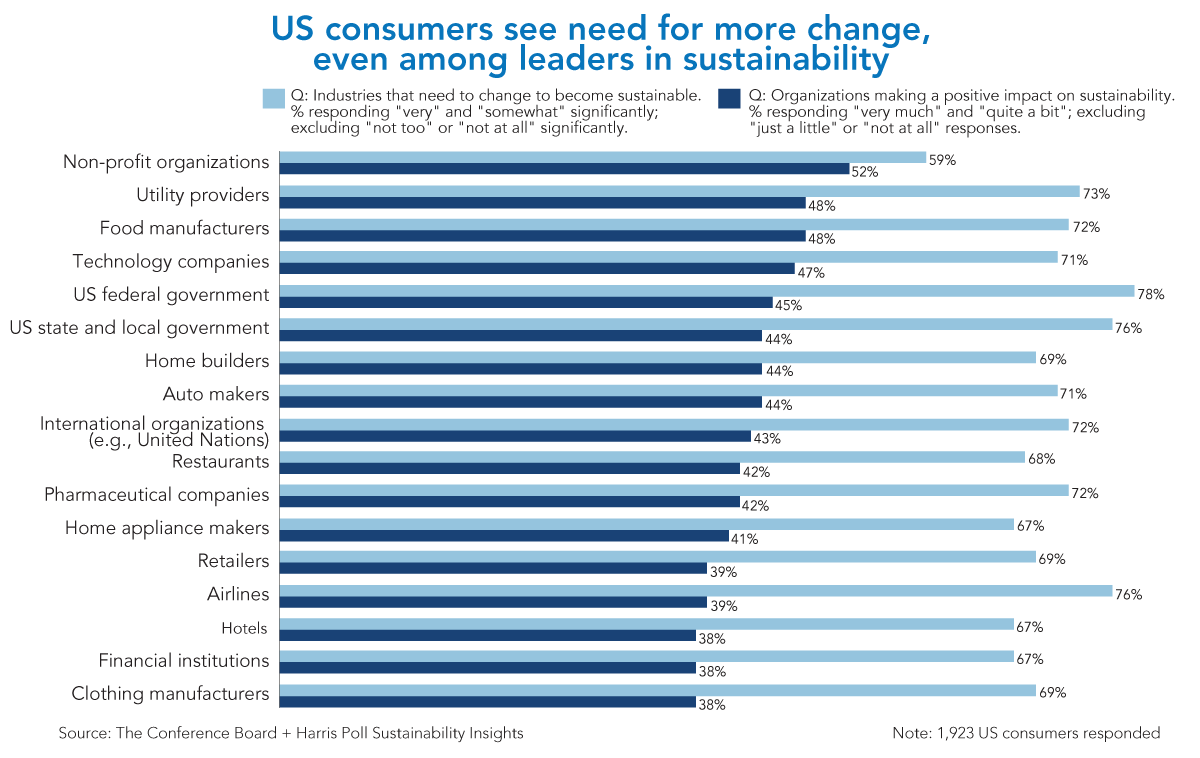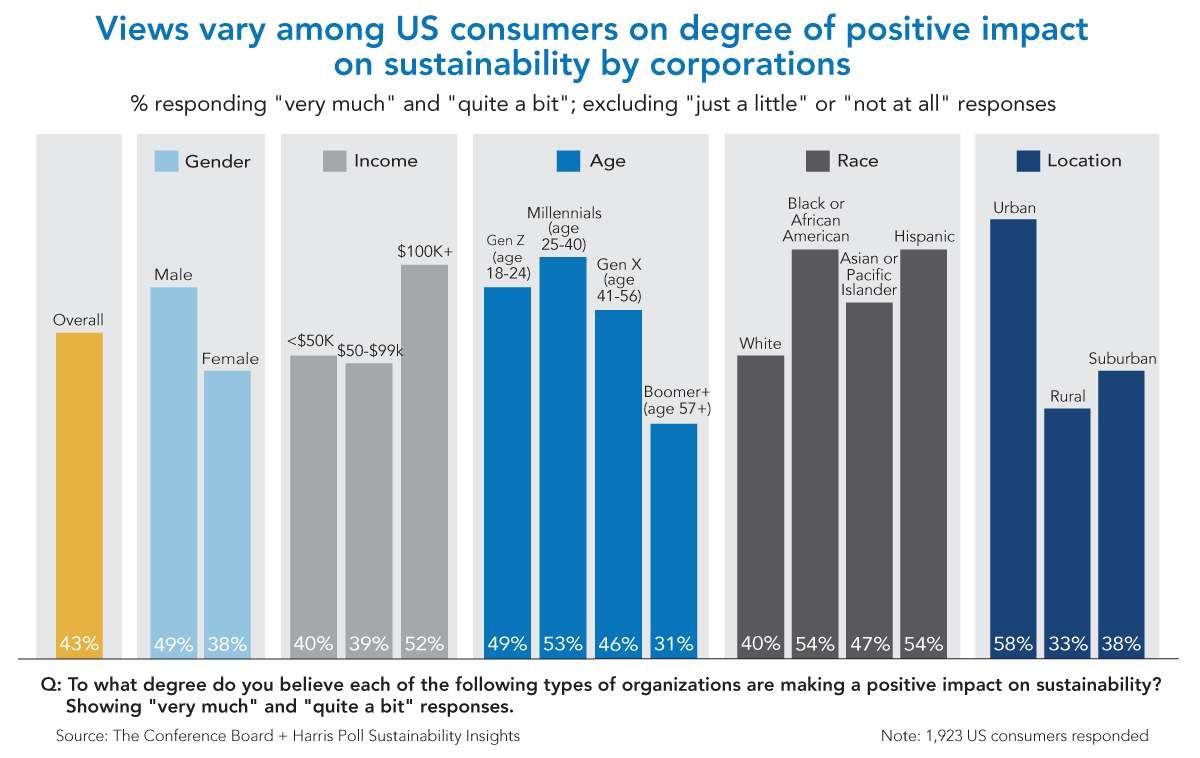Results from our survey of US consumers to inform brand and communications strategies for sustainability initiatives
See Part 2: Sustainability Features That Sway US Consumers Are Changing
US consumers are recognizing that businesses help protect the environment and promote social causes, but most still see the need for more change across a range of industries to advance sustainability. More than a third of consumers in our survey on sustainability perceptions—and up to half of them for select industries—say industries are making a positive impact.
Yet consumers are not all of one mind. Perceptions about the progress that businesses and governments are making with sustainability vary significantly by demographic segments.
These findings can help marketers decide where to make investments—from development to communications to post-use—to distinguish their brand and help advance sustainability through a greater uptake of sustainable products and services.
This report reflects the views of 1,923 adults in the US, surveyed jointly by The Conference Board and The Harris Poll in September 2021. We didn’t provide a definition of sustainability for consumers taking the survey, but by asking what they associate with sustainable products, we can see how consumers understand the term. Most associate sustainability with environmental issues such as conservation of natural resources and climate change—ahead of social issues including fair prices, wages, and labor conditions.
Insights for What’s Ahead
- There is consumer interest in supporting corporate sustainability efforts. Yet the premium price that sustainable products or services command is a significant barrier for them, our research has shown.[1] Innovations to better balance product quality, price, and convenience will help toward greater consumer acceptance of sustainable alternatives.
- Consumer expectations for faster progress are likely to increase. Consumers say change is needed across a range of industries to advance sustainability. Partnering with established or emerging initiatives and—even more—showing a willingness to collaborate with competitors for the common good can signal a company’s commitment to stakeholders. Moreover, alliances can lead to cost-effective solutions in the private sector and better-targeted policies, incentives, subsidies, and government-funded research.
- Internal teams that closely collaborate can maximize returns from sustainability efforts. The marketing function plays a crucial role in a company’s sustainability drive. In fact, after the CEO, the sustainability function is most likely to report to the chief marketing officer, according to recent research by The Conference Board.[2] Marketing can inform the firm’s sustainability strategy and help drive sustainability-linked innovation by bringing consumer perspectives, ideas about products, and attitudes toward pricing to the table. Closer collaboration with the finance team can also help marketers determine the pricing for sustainable products and services, which usually carry higher costs that often can’t be fully passed on to consumers. In both the US and Europe, the sustainability team’s interaction with the finance team is relatively low, The Conference Board finds.[3] A collaboration among sustainability, strategy, marketing, and finance makes planning more complex but can have great rewards.
- Communications have room to step up. Are you talking about your products’ sustainability benefits in relatable, concrete terms rather than with technical descriptions? Lack of awareness of, understanding of, and trust in sustainability claims are all important barriers to consumers’ buying sustainable products more often, according to our prior research.[4] Consider tailoring messaging for different demographic segments. Our survey analysis shows diverse attitudes and perceptions regarding sustainability.
Survey findings: Perceptions of business impact on sustainability

Consumers continue to see utilities, technology, and food companies as sustainability leaders
Three industries rise above the rest in making a positive impact on sustainability for consumers, unchanged from survey results in 2019: utilities, technology, and food companies.[5] Close behind these are home builders, automakers, restaurants, pharmaceuticals makers, and home appliance makers. Perceptions matter—not just for increasing sales but for attracting and retaining talent, investors, and other business partners.
Most consumers say more change is needed in all types of businesses as well as governments to advance sustainability
For example, 76 percent of respondents say airlines will have to do more to become sustainable, with 36 percent saying very significant change is needed. Companies that act on sustainability and communicate their commitment can consider partnering to increase impact. Companies can amplify their efforts through collaboration with policymakers, researchers, technology partners, and even competitors. Indeed, unusual collaborations and private-public partnerships, particularly in industries such as airlines and utilities, are called for to develop feasible and effective solutions to complex challenges such as climate change and social inequality.
Mind the gap between what consumers perceive as progress on corporate sustainability and what they consider sustainable
Companies can strive to make it easier by minimizing consumers’ sense of making sacrifices in product quality, convenience, or price. Specific actions companies can take to become more sustainable will vary by sector. Consumers’ perception that industries like airlines, carmakers, and utilities have relatively more work to do could facilitate taxpayer support for public-private partnerships and government funding of research and innovation.
Residential location is a key influence on perceptions about sustainability

Urban dwellers have relatively higher positive feelings toward corporate sustainability, possibly driven by a generally greater awareness of its need in densely populated areas and the greater visibility of brand initiatives in cities.
These findings also indicate a potential for companies to extend sustainability messaging beyond a younger and more urban consumer. Perceptions about private and public sector impacts on sustainability vary widely across demographic segments. For demographic groups that may be less receptive to sustainability messages, companies can consider embedding them in brand or corporate communications that aren’t specifically focused on sustainability.
Methodology & The Conference Board + The Harris Poll Collaboration
This report is the first of two reports from our survey of US consumer perceptions around corporate sustainability. In the second report, we explore which sustainability features inspire brand purchases.
The survey is a collaboration between The Conference Board and The Harris Poll. It ran in the US from September 3-5, 2021, and yielded responses from 1,923 adults. Results are weighted to represent the US adult population.
We greatly appreciate the ongoing collaboration with Rob Jekielek, Managing Director at The Harris Poll, who made this research possible.
[1] Denise Dahlhoff, “How Sustainability Features Influence Consumers’ Choices,” The Conference Board, February 2020.
[4] Dahlhoff, “How Sustainability Features Influence Consumers’ Choices.”
Results from our survey of US consumers to inform brand and communications strategies for sustainability initiatives
See Part 2: Sustainability Features That Sway US Consumers Are Changing
US consumers are recognizing that businesses help protect the environment and promote social causes, but most still see the need for more change across a range of industries to advance sustainability. More than a third of consumers in our survey on sustainability perceptions—and up to half of them for select industries—say industries are making a positive impact.
Yet consumers are not all of one mind. Perceptions about the progress that businesses and governments are making with sustainability vary significantly by demographic segments.
These findings can help marketers decide where to make investments—from development to communications to post-use—to distinguish their brand and help advance sustainability through a greater uptake of sustainable products and services.
This report reflects the views of 1,923 adults in the US, surveyed jointly by The Conference Board and The Harris Poll in September 2021. We didn’t provide a definition of sustainability for consumers taking the survey, but by asking what they associate with sustainable products, we can see how consumers understand the term. Most associate sustainability with environmental issues such as conservation of natural resources and climate change—ahead of social issues including fair prices, wages, and labor conditions.
Insights for What’s Ahead
- There is consumer interest in supporting corporate sustainability efforts. Yet the premium price that sustainable products or services command is a significant barrier for them, our research has shown.[1] Innovations to better balance product quality, price, and convenience will help toward greater consumer acceptance of sustainable alternatives.
- Consumer expectations for faster progress are likely to increase. Consumers say change is needed across a range of industries to advance sustainability. Partnering with established or emerging initiatives and—even more—showing a willingness to collaborate with competitors for the common good can signal a company’s commitment to stakeholders. Moreover, alliances can lead to cost-effective solutions in the private sector and better-targeted policies, incentives, subsidies, and government-funded research.
- Internal teams that closely collaborate can maximize returns from sustainability efforts. The marketing function plays a crucial role in a company’s sustainability drive. In fact, after the CEO, the sustainability function is most likely to report to the chief marketing officer, according to recent research by The Conference Board.[2] Marketing can inform the firm’s sustainability strategy and help drive sustainability-linked innovation by bringing consumer perspectives, ideas about products, and attitudes toward pricing to the table. Closer collaboration with the finance team can also help marketers determine the pricing for sustainable products and services, which usually carry higher costs that often can’t be fully passed on to consumers. In both the US and Europe, the sustainability team’s interaction with the finance team is relatively low, The Conference Board finds.[3] A collaboration among sustainability, strategy, marketing, and finance makes planning more complex but can have great rewards.
- Communications have room to step up. Are you talking about your products’ sustainability benefits in relatable, concrete terms rather than with technical descriptions? Lack of awareness of, understanding of, and trust in sustainability claims are all important barriers to consumers’ buying sustainable products more often, according to our prior research.[4] Consider tailoring messaging for different demographic segments. Our survey analysis shows diverse attitudes and perceptions regarding sustainability.
Survey findings: Perceptions of business impact on sustainability

Consumers continue to see utilities, technology, and food companies as sustainability leaders
Three industries rise above the rest in making a positive impact on sustainability for consumers, unchanged from survey results in 2019: utilities, technology, and food companies.[5] Close behind these are home builders, automakers, restaurants, pharmaceuticals makers, and home appliance makers. Perceptions matter—not just for increasing sales but for attracting and retaining talent, investors, and other business partners.
Most consumers say more change is needed in all types of businesses as well as governments to advance sustainability
For example, 76 percent of respondents say airlines will have to do more to become sustainable, with 36 percent saying very significant change is needed. Companies that act on sustainability and communicate their commitment can consider partnering to increase impact. Companies can amplify their efforts through collaboration with policymakers, researchers, technology partners, and even competitors. Indeed, unusual collaborations and private-public partnerships, particularly in industries such as airlines and utilities, are called for to develop feasible and effective solutions to complex challenges such as climate change and social inequality.
Mind the gap between what consumers perceive as progress on corporate sustainability and what they consider sustainable
Companies can strive to make it easier by minimizing consumers’ sense of making sacrifices in product quality, convenience, or price. Specific actions companies can take to become more sustainable will vary by sector. Consumers’ perception that industries like airlines, carmakers, and utilities have relatively more work to do could facilitate taxpayer support for public-private partnerships and government funding of research and innovation.
Residential location is a key influence on perceptions about sustainability

Urban dwellers have relatively higher positive feelings toward corporate sustainability, possibly driven by a generally greater awareness of its need in densely populated areas and the greater visibility of brand initiatives in cities.
These findings also indicate a potential for companies to extend sustainability messaging beyond a younger and more urban consumer. Perceptions about private and public sector impacts on sustainability vary widely across demographic segments. For demographic groups that may be less receptive to sustainability messages, companies can consider embedding them in brand or corporate communications that aren’t specifically focused on sustainability.
Methodology & The Conference Board + The Harris Poll Collaboration
This report is the first of two reports from our survey of US consumer perceptions around corporate sustainability. In the second report, we explore which sustainability features inspire brand purchases.
The survey is a collaboration between The Conference Board and The Harris Poll. It ran in the US from September 3-5, 2021, and yielded responses from 1,923 adults. Results are weighted to represent the US adult population.
We greatly appreciate the ongoing collaboration with Rob Jekielek, Managing Director at The Harris Poll, who made this research possible.
[1] Denise Dahlhoff, “How Sustainability Features Influence Consumers’ Choices,” The Conference Board, February 2020.
[4] Dahlhoff, “How Sustainability Features Influence Consumers’ Choices.”




